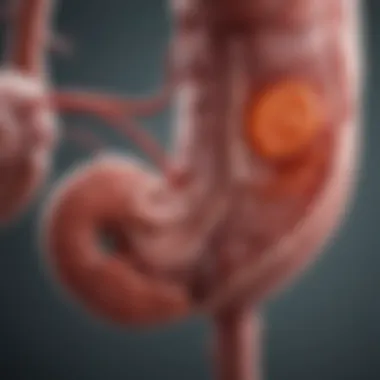Chronic Renal Failure: Comprehensive Insights into CKD


Intro
Chronic renal failure, or chronic kidney disease (CKD), is increasingly recognized as a public health concern that significantly influences patient morbidity and mortality. This condition involves a gradual decline in kidney function over time, leading to the accumulation of waste products in the bloodstream. Understanding chronic renal failure encompasses various facets that include its causes, progression, diagnosis, management, and its effects on the overall quality of life for patients.
Key Concepts
Definition of Primary Terms
The term chronic renal failure refers to a long-term condition where the kidneys lose their filtering ability. This means they cannot adequately eliminate metabolic waste and excess fluid. The progression of CKD occurs over stages, classified usually from stage 1 (mild) to stage 5 (end-stage renal disease).
Kidney function is commonly assessed using the estimated glomerular filtration rate (eGFR), calculated from blood creatinine levels, age, gender, and race. The kidneys play an essential role in maintaining homeostasis by regulating electrolyte balance, blood pressure, and acid-base balance. When kidney function deteriorates, patients may require dialysis or kidney transplantation as definitive management options.
Related Concepts and Theories
Chronic renal failure often arises due to multiple factors. Key contributors include diabetes mellitus, hypertension, and various glomerular diseases. The pathophysiology involves a complex interplay of hemodynamic changes, inflammatory pathways, and fibrotic processes. For instance, in diabetic nephropathy, hyperglycemia leads to vascular changes and contributes to glomerulosclerosis, thereby impairing kidney function.
Among related theories, the concept of kidney adaptability suggests that kidneys can endure a significant level of damage before exhibiting overt function loss. This adaptability is crucial as it explains why symptoms may not appear until the disease is advanced.
"Chronic kidney disease is often dubbed as a silent killer because individuals may remain asymptomatic until the later stages."
Future Directions
Gaps Identified in Current Research
Despite advancements, substantial gaps remain in CKD research. There is a need for better understanding of the disease progression and individualized treatment approaches. Current therapeutic interventions mainly focus on slowing the progression rather than reversing existing damage. Additionally, research on ethnic disparities in CKD prevalence and outcomes warrants further exploration.
Suggestions for Further Studies
Future studies should focus on early identification and prevention strategies, possibly involving pharmacological interventions in high-risk individuals. The role of personalized medicine in CKD management could offer novel insights into tailored therapies. Additionally, examining the psychosocial impacts of chronic renal failure on patients and their families may yield significant benefits for comprehensive care approaches.
Understanding Chronic Renal Failure
Understanding chronic renal failure is crucial for both healthcare professionals and patients. This condition signifies a gradual loss of kidney function, which can lead to significant health complications if not managed properly. A comprehensive understanding helps in early detection, intervention, and management of the disease, ultimately improving patient outcomes.
Definition and Overview
Chronic renal failure, also known as chronic kidney disease (CKD), is defined as a gradual decline in kidney function over months or years. A key feature of this condition is a reduction in the glomerular filtration rate (GFR), which measures how well the kidneys filter waste from the blood. CKD can lead to kidney failure, characterized by the kidneys' inability to perform their essential functions such as filtering waste and maintaining fluid and electrolyte balance.
Diagnosis involves identifying risk factors, symptoms, and abnormalities in kidney function tests. Key metrics such as serum creatinine levels and urine protein concentration are often used in the evaluation process. Early identification and intervention are critical in slowing the disease's progression and managing complications.
Epidemiological Statistics
The prevalence of chronic renal failure is a growing concern worldwide. According to recent statistics, it affects approximately 10-15% of the global population. Certain demographics, particularly older adults and individuals with diabetes or hypertension, bear a higher burden of this condition.
- Age Factor: The incidence of CKD increases with age. Over 35% of individuals aged 65 and older may exhibit some form of kidney impairment.
- Diabetes: Diabetes is a principal cause of CKD, accounting for approximately 30-40% of cases.
- Hypertension: Hypertensive patients have a significantly increased risk of renal failure, with around 25% of those diagnosed facing chronic kidney issues.
The global health perspective highlights the importance of preventive measures. Community education and screening programs can help identify individuals at risk, enabling timely intervention.
"Early detection of chronic renal failure not only improves prognosis but also reduces healthcare costs associated with advanced disease management."
Understanding these statistics informs health policy and resource allocation, as the burden of CKD on healthcare systems is substantial, necessitating concerted efforts for better patient care.
Pathophysiology of Chronic Renal Failure
Understanding the pathophysiology of chronic renal failure (CRF) is crucial in grasping how the disease progresses and impacts overall health. The kidneys serve several critical functions that extend beyond merely filtering waste. Their roles include regulating blood pressure, maintaining electrolyte balance, and supporting red blood cell production through erythropoietin. When renal function declines, these processes become compromised, leading to systemic consequences. Therefore, exploring the underlying mechanisms of kidney failure not only assists in diagnosis but also lays the groundwork for effective interventions.
Kidney Structure and Function
Healthy kidneys consist of roughly one million nephrons each, which are the functional units responsible for glomerular filtration, tubular reabsorption, and secretion. Each nephron is composed of a glomerulus, where blood filtering begins, and a renal tubule, where essential substances are reabsorbed back into the bloodstream. There are several structural parts, including the proximal tubule, loop of Henle, and distal tubule, each playing a distinctive role.
The kidneys also regulate acid-base balance and fluid homeostasis. Disruption in these functions leads to complications that can manifest as hypertension, electrolyte imbalances, or metabolic acidosis. Understanding these physiological processes unveils how chronic damage, such as scarring from diabetes or hypertension, leads to the progressive nature of CRF.
Mechanisms of Kidney Damage
Chronic renal failure can arise from various underlying conditions or insults. The specific mechanisms can be categorized into several pathways:
- Ischemic Injury: Reduced blood flow can cause cellular death and fibrotic changes in nephrons.
- Toxic Injury: Certain drugs, or environmental toxins can directly damage kidney tissues.
- Inflammatory Processes: Conditions such as glomerulonephritis involve immune-mediated damage.
The processes may overlap, and often, multiple factors contribute simultaneously to kidney damage. Additionally, the loss of nephron function leads to further adaptive changes that may not be beneficial in the long term.
Chronic renal failure signifies a long process where early intervention can prevent irreversible loss of function.
As the disease progresses, compensatory mechanisms may temporarily mask symptoms. However, over time, the compensatory capacity diminishes, leading to elevated serum creatinine and urea nitrogen levels. Adequate understanding of these mechanisms is vital in guiding treatment options and monitoring disease progression.
Stages of Chronic Renal Failure
Understanding the stages of chronic renal failure is essential for both the management of the disease and the improvement of patient outcomes. Chronic kidney disease (CKD) is classified into specific stages based on the degree of kidney damage and function. These stages help healthcare providers determine the appropriate interventions and monitor disease progression. The meticulous classification allows for a more tailored treatment approach, as well as raises awareness about the importance of early detection. Recognizing the significance of these stages contributes to a comprehensive understanding of CKD and its impact on patient quality of life.
Classification of Stages
Chronic renal failure is classified into five stages based on the estimated glomerular filtration rate (eGFR). This classification is a crucial part of understanding CKD's progression and helps in clinical decision-making. Here is a brief overview of each stage:
- Stage 1: Normal or high eGFR (≥90 mL/min) with other signs of kidney damage.
- Stage 2: Mild decrease in eGFR (60-89 mL/min) with other kidney damage indicators.
- Stage 3: Moderately decreased eGFR (30-59 mL/min), often requiring monitoring and potential intervention.
- Stage 4: Severe decrease in eGFR (15-29 mL/min), where preparation for renal replacement therapy may begin.
- Stage 5: Kidney failure (eGFR 15 mL/min), necessitating dialysis or transplantation.


These stages underscore the varied clinical aspects of CKD and highlight how early detection can influence treatment strategies.
Progression and Transition Between Stages
The progression of chronic renal failure is typically gradual, but several factors can influence the rate at which a patient transitions from one stage to the next. These factors include:
- Underlying causes: Conditions such as hypertension and diabetes contribute significantly to kidney damage.
- Adherence to treatment: Patients who follow prescribed management plans tend to have slower progression of the disease.
- Lifestyle factors: Diet, exercise, and substance use can greatly impact kidney health.
"Monitoring eGFR regularly can help in identifying problematic changes that may lead to a faster progression of kidney disease."
Understanding how these factors interplay provides insights that can guide healthcare professionals in creating targeted intervention strategies. Continuous monitoring is vital, as it allows for timely adjustments in treatment, ultimately aiming to slow disease progression and improve patient outcomes.
Risk Factors for Chronic Renal Failure
Understanding the risk factors for chronic renal failure is crucial for prevention and management. Identifying these factors can help healthcare professionals implement early intervention strategies and tailor treatment plans to individual patients. This section investigates both non-modifiable and modifiable risk factors, providing insights into their significance in the context of chronic kidney disease (CKD).
Non-Modifiable Risk Factors
Non-modifiable risk factors are those that cannot be changed. Their presence often signals a higher risk for developing chronic renal failure. Key non-modifiable factors include:
- Age: The likelihood of developing CKD increases with age. Individuals over 60 years are at a greater risk, as kidney function gradually declines with time.
- Genetics: Family history of kidney disease is a significant predictor. Specific hereditary conditions, such as polycystic kidney disease, heighten susceptibility to renal failure.
- Ethnicity: Certain ethnic groups, such as African American and Hispanic populations, exhibit higher rates of CKD. Genetic predisposition may contribute to this disparity.
While these factors cannot be altered, awareness of them is essential for proactive healthcare. They enable healthcare providers to monitor at-risk individuals more closely and offer guidance on lifestyle choices and screening.
Modifiable Risk Factors
In contrast, modifiable risk factors are those that individuals can change or manage to reduce their risk of chronic renal failure. Addressing these factors can significantly impact kidney health. Important modifiable risk factors include:
- Hypertension: Uncontrolled blood pressure can lead to kidney damage. Regular monitoring and management of hypertension are vital in preventing CKD.
- Diabetes: Diabetes enables the development of diabetic nephropathy, one of the leading causes of CKD. Maintaining stable blood sugar levels through diet, exercise, and medication is crucial.
- Obesity: Excess weight contributes to both diabetes and hypertension, which can further precipitate renal failure. Weight loss through lifestyle changes can alleviate these risks.
- Smoking: Tobacco use has adverse effects on vascular health and is linked to an increased risk of kidney disease. Quitting smoking can improve overall health and decrease the likelihood of CKD.
- Diet: Poor dietary habits exacerbate conditions like obesity and hypertension. A balanced diet low in salt, saturated fats, and sugars can be beneficial for maintaining kidney health.
"Identifying and addressing modifiable risk factors can lead to significant improvements in patient outcomes and quality of life."
Symptoms and Clinical Manifestations
Understanding the symptoms and clinical manifestations of chronic renal failure is essential for timely diagnosis and management. Recognizing these signs can provide valuable insights into the progression of kidney disease. Early detection plays a critical role in delaying progression to end-stage renal disease. By understanding these symptoms, healthcare providers can better tailor their interventions and improve patient outcomes.
Early Symptoms
The early symptoms of chronic renal failure are often subtle, which can make them difficult to notice. These symptoms typically include:
- Fatigue: A general sense of tiredness is common. This may be due to anemia or the buildup of toxins in the bloodstream.
- Fluid Retention: Patients may observe swelling in their hands, feet, or face. This occurs when the kidneys fail to remove excess fluid effectively.
- Changes in Urination: Variability in urine output, which may include increased frequency at night or changes in color and consistency, can be observed.
- Reduced Appetite and Taste Changes: A decreased desire to eat may develop, often due to uremic toxins affecting taste buds.
- Nausea and Vomiting: These symptoms can arise as waste products build up in the body, leading to gastrointestinal discomfort.
Awareness of these symptoms facilitates earlier medical consultation and intervention. For many patients, these initial manifestations may be mistaken for other ailments, emphasizing the need for vigilance in monitoring health.
Advanced Symptoms
As chronic renal failure progresses, more severe symptoms emerge, signaling a significant decline in kidney function. Advanced symptoms include:
- Severe Fatigue and Weakness: The feeling of exhaustion can become overwhelming, affecting daily activities and quality of life.
- Persistent Itching: Known as uremic pruritus, this symptom is often due to the accumulation of phosphate and other toxins.
- Cognitive Impairment: Patients may experience confusion or difficulty concentrating, as the brain is affected by toxic buildup.
- Hypertension: High blood pressure becomes more prevalent and is often difficult to control within this population.
- Bone Pain or Weakness: Changes in bone density may occur as a result of mineral and bone disorders associated with chronic kidney disease.
"Recognizing advanced symptoms is crucial for immediate intervention, which can substantially affect patient prognosis."
The presence of these advanced symptoms typically indicates that the body is significantly struggling with waste elimination. Immediate medical attention becomes imperative at this stage.
Awareness and education surrounding both early and advanced symptoms of chronic renal failure can foster proactive health management. For patients and caregivers alike, understanding these manifestations can help facilitate timely diagnosis and treatment.
Diagnosis of Chronic Renal Failure
Diagnosing chronic renal failure, also known as chronic kidney disease (CKD), is an essential aspect of managing this progressive condition. Early detection can significantly influence the course of treatment, patient outcomes, and quality of life. The primary goal of diagnosis is to identify kidney impairment before reaching advanced stages where therapeutic options become limited. This section will discuss clinical guidelines and the role of laboratory tests and imaging techniques in the diagnosis of chronic renal failure.
Clinical Guidelines
Clinical guidelines for diagnosing chronic renal failure are formulated based on evidence-based practices that aid healthcare professionals in effectively assessing kidney function. Key elements of these guidelines include:
- Patient History and Physical Examination: Healthcare providers typically begin with a thorough patient history, including risk factors such as diabetes, hypertension, and family history of kidney disease. A physical examination may reveal signs such as edema, hypertension, or other related issues.
- Urine Tests: A urinalysis is often the first diagnostic test performed. It examines urine composition, looking for abnormalities such as proteinuria, which can indicate kidney damage.
- Serum Creatinine Levels: Measuring serum creatinine is critical. Elevated levels often signal reduced kidney function. The estimated glomerular filtration rate (eGFR) is calculated from creatinine levels and provides a more accurate assessment of kidney function.
- Staging of CKD: Once CKD is diagnosed, staging is essential to determine the severity of the disease and guide management strategies. The Kidney Disease Outcomes Quality Initiative (KDOQI) outlines stages that correlate with eGFR values, allowing healthcare providers to tailor interventions based on the stage.
Following these guidelines ensures a standardized approach, optimizing early detection and treatment pathways.
Laboratory Tests and Imaging
Laboratory tests and imaging studies are integral to the diagnosis of chronic renal failure. They help establish the presence of the disease and assess its progression:
- Comprehensive Metabolic Panel: This blood test evaluates various parameters, including bicarbonate, electrolyte levels, and blood urea nitrogen (BUN), providing insights into kidney function.
- Urinary Biomarkers: More advanced testing may include urinary biomarker analysis, which can detect early signs of kidney injury, thus allowing for prompt intervention.
- Imaging Techniques: Techniques such as ultrasound and CT scans can visualize kidney size, structure, and abnormalities. Imaging plays a crucial role in ruling out obstruction or other anatomical issues that could contribute to renal failure.
The integration of laboratory and imaging studies enhances the accuracy of chronic renal failure diagnosis and facilitates timely management interventions.
Management Approaches
Managing chronic renal failure is critical for improving patient outcomes and preventing further deterioration of kidney function. Effective management encompasses multiple facets, including dietary changes, medications, and renal replacement therapies. Each component plays a unique role in the overall treatment strategy, addressing both the physiological needs of the body and the psychological wellbeing of patients. Hence, it is not only about prolonging life but enhancing the quality of life for those affected by this debilitating condition.
Dietary Management
Diet plays an essential part in the management of chronic renal failure. A well-structured diet can slow the progression of kidney disease and minimize complications. Patients often need to limit intake of protein, sodium, potassium, and phosphorus.


- Protein Reduction: Reducing protein intake can decrease the burden on kidneys, delaying decline in function. However, it needs to be carefully monitored to ensure that nutritional requirements are still met.
- Fluid Management: Patients may need to restrict fluid intake to prevent fluid overload, which is common in renal failure. This helps manage edema and hypertension.
- Electrolyte Control: Monitoring and balancing electrolytes is crucial. Foods high in potassium, for example, like bananas and potatoes, might need to be avoided.
Regular consultations with a dietitian can help customize dietary plans to individual patient needs, aiding in better management of chronic renal failure.
Medications and Therapeutics
Pharmacological management of chronic renal failure involves various medications that aim to control symptoms, manage complications, and minimize disease progression. There are several categories of medications:
- Antihypertensives: High blood pressure is a common issue in renal failure. Medications like Lisinopril or Losartan not only manage blood pressure but also provide renal protective benefits.
- Erythropoiesis-Stimulating Agents (ESAs): To combat anemia associated with renal failure, medications such as Epoetin alfa can stimulate the production of red blood cells, helping to improve energy levels and overall quality of life.
- Phosphate Binders: These help to control elevated phosphate levels, thereby preventing bone disorders and cardiovascular issues. Common phosphate binders include Sevelamer and Calcium acetate.
Additionally, careful monitoring of medication side effects is imperative, as patients may have varying metabolic responses.
Renal Replacement Therapy Options
As chronic renal failure progresses, renal replacement therapy may become necessary. This option includes dialysis and kidney transplantation, which are crucial for patient survival.
- Dialysis: This treatment can be either hemodialysis or peritoneal dialysis. Hemodialysis is performed in a clinic where the blood is filtered through a machine. Peritoneal dialysis, on the other hand, utilizes the lining of the abdomen as a filter and is typically managed at home. The choice between the two depends on various factors, including the patient's lifestyle, health condition, and personal preferences.
- Kidney Transplantation: This is a more definitive solution and involves placing a healthy kidney from a donor into a patient’s body. Transplantation may dramatically improve quality of life, but it requires a suitable donor and lifelong immunosuppression to prevent rejection of the new organ.
"Effective management can significantly alter the course of chronic renal failure and its associated complications."
Incorporating comprehensive strategies will ensure a holistic treatment plan that addresses physical, emotional, and social aspects of the disease.
Complications Associated with Chronic Renal Failure
Chronic renal failure can lead to various complications that significantly affect the patient’s health and quality of life. Understanding these complications is imperative for both healthcare professionals and patients alike. Evaluating the consequences of chronic kidney disease goes beyond just the medical realm, as it demands a holistic approach to manage symptoms and improve the patient's overall well-being.
Complications arising from chronic renal failure can influence multiple organ systems, often resulting in severe health issues. Astute awareness of these complications helps in better management and can improve patient outcomes. This article section will unfold the principal complications associated with chronic renal failure, which include cardiovascular issues, bone and mineral disorders, as well as anemia and other hematological complications.
Cardiovascular Issues
The connection between chronic renal failure and cardiovascular health is significant. Patients with chronic kidney disease (CKD) have a markedly higher risk of developing cardiovascular diseases as compared to the general population. The underlying reasons include hypertension, fluid imbalance, and metabolic disturbances that occur due to kidney dysfunction.
Common cardiovascular complications related to chronic renal failure may include:
- Hypertension: Often exacerbated by fluid overload and hormone changes, uncontrolled high blood pressure poses serious risks for heart disease.
- Heart Failure: The heart may struggle to pump blood effectively, leading to heart failure, particularly in advanced stages of CKD.
- Atherosclerosis: Buildup of plaque in the arteries can occur, increasing the risk of heart attacks and strokes.
Managing these cardiovascular concerns often requires a multidisciplinary approach, integrating lifestyle modifications, medications, and regular monitoring of the patient’s cardiovascular health.
Bone and Mineral Disorders
Another critical aspect of chronic renal failure is its impact on bone health and mineral metabolism. Kidneys help regulate calcium and phosphorus levels, which are vital for maintaining bone density and overall skeletal health. In CKD, the impaired kidney function disrupts these processes, causing complications such as:
- Renal Osteodystrophy: This condition is characterized by bone pain and deformities due to imbalances in calcium, phosphorus, and vitamin D metabolism.
- Hyperphosphatemia: Increased levels of phosphate in the bloodstream can lead to calcification of soft tissues, further complicating the patient’s health.
- Low Vitamin D Levels: As the kidneys become less effective in converting vitamin D into its active form, patients may suffer from osteomalacia or weakened bones.
Management strategies for bone and mineral disorders often entail dietary adjustments, phosphate binders, and vitamin D supplementation to mitigate these risks.
Anemia and Other Hematological Complications
Anemia is a frequent complication faced by individuals with chronic renal failure. The kidneys produce erythropoietin, a hormone that stimulates red blood cell production. When kidney function declines, this hormone's production diminishes, leading to anemia. Patients may experience:
- Fatigue: A common symptom due to insufficient oxygen delivery to tissues.
- Pallor and Weakness: Resulting from decreased hemoglobin levels.
- Increased Risk of Cardiovascular Events: Severe anemia can exacerbate existing cardiovascular issues, creating a cycle of increased morbidity.
Addressing anemia in CKD often involves the use of erythropoiesis-stimulating agents, iron supplementation, and careful monitoring of hemoglobin levels.
"Anemia represents one of the significant hurdles that patients with chronic renal failure face, demanding proactive intervention to enhance their quality of life."
Psychosocial Impact
The psychosocial impact of chronic renal failure (CRF) is often underappreciated in clinical discussions. Yet, it plays a critical role in how patients manage their illness and the overall effectiveness of treatment strategies. Understanding this facet helps healthcare providers deliver more holistic care, addressing not just the physiological aspects of the disease, but also the emotional, social, and psychological burdens that accompany it.
Patients suffering from CRF frequently experience significant changes in their quality of life. These changes often stem from the need for ongoing treatment, such as dialysis, or the need to adhere to strict dietary restrictions. The management of these practical elements can lead to increased stress and anxiety for patients.
Quality of Life Considerations
Assessing quality of life in patients with CRF involves examining multiple dimensions, including physical well-being, social interactions, and emotional health. Many patients report a decline in physical health due to fatigue and other symptoms related to kidney dysfunction. This decline can restrict physical activity, leading to reduced social engagement.
Furthermore, the dietary restrictions imposed by renal failure can affect not only physical health but also social experiences, such as dining with family or friends. These limitations can contribute to feelings of isolation and dissatisfaction with life.
Healthcare providers often utilize various quality of life measurement tools to gauge how CRF affects individuals. Common metrics include:
- Physical Functioning: Assesses one's ability to perform daily activities.
- Emotional Well-Being: Evaluates feelings of depression and anxiety.
- Social Functioning: Looks at the impact of the illness on social activities.
The interplay between health and quality of life is essential for patient's mental resilience and overall success in managing chronic conditions.
Mental Health Challenges
Mental health is a significant concern for individuals diagnosed with CRF. Studies show a high prevalence of anxiety and depression among these patients. This association is not unexpected given the weight of living with a chronic and often progressive illness. Challenges such as uncertainty about disease progression, the burden of constant medical appointments, and the side effects of medications compound mental health issues.
Patients with chronic renal failure might also face stigma associated with their condition, which can further exacerbate feelings of inadequacy or guilt. Some common mental health challenges include:
- Depression: Patients may feel a pervasive sense of hopelessness, impacting compliance with treatment plans.
- Anxiety: Worry about health outcomes can lead to chronic anxiety, which can interfere with daily living.
Thus, it is vital for healthcare providers to incorporate mental health screening into routine care for patients with CRF. Addressing these challenges through counseling, support groups, or medication can make a significant difference in a patient’s ability to cope with their condition. By doing so, the healthcare system can enhance overall treatment outcomes and improve the quality of life for patients.


Prognosis and Outcomes
Understanding the prognosis and outcomes in chronic renal failure is essential for both patients and healthcare providers. It provides insights into disease progression, treatment efficacy, and potential life expectancy. Accurate prognostic assessment helps to tailor management strategies that align with the patient's clinical status and preferences. Moreover, discussing prognosis can facilitate better communication between patients and clinicians, fostering informed decision-making.
Survival Rates Across Stages
Survival rates in chronic renal failure demonstrate significant variability depending on the stage of the disease. The classification of chronic kidney disease into five stages, based on glomerular filtration rate (GFR), influences survival expectations.
- Stage 1: In this initial stage, patients often maintain a normal or near-normal GFR. The survival rates are generally high, with many individuals living a long life without significant complications.
- Stage 2: Individuals in this stage experience mild decrease in kidney function. Again, survival rates remain favorable, though regular monitoring becomes increasingly important.
- Stage 3: At this intermediate stage, survival rates begin to dip, and patients may start to feel symptoms of kidney dysfunction. Studies suggest a 10-year survival rate of approximately 70-80% at this point.
- Stage 4: This stage indicates severe kidney damage, characterized by a significantly reduced GFR. The risk of cardiovascular events rises, and long-term survival may drop to about 50-60% over the next five years.
- Stage 5: This final stage, also known as end-stage renal disease, requires renal replacement therapy, either through dialysis or transplantation. Survival rates in this stage are heavily dependent on timely intervention and the patient's overall health.
It is crucial to acknowledge that survival depends not only on kidney function but also on comorbidities, patient adherence to treatment, and socioeconomic factors.
Factors Influencing Prognosis
Several factors can impact the prognosis of individuals with chronic renal failure. Identifying these influences can aid in the prediction of disease progression and the development of personalized management plans.
- Comorbid Conditions: The presence of diseases such as diabetes, hypertension, and cardiovascular disease can complicate chronic renal failure and lead to worse outcomes.
- Age: Older adults generally have poorer prognoses due to the accumulation of health issues and reduced physiological reserve.
- Gender: Some studies have suggested differences in outcomes between genders, with female patients sometimes exhibiting a better prognosis than males.
- Proteinuria: Higher levels of protein in urine often correlate with a faster decline in kidney function. Tracking proteinuria can be a valuable prognostic tool.
- Adherence to Treatment: Patient compliance with prescribed medications and lifestyle modifications is vital. Those who engage in proactive management tend to have better outcomes.
- Social Support: A strong support system can positively affect mental well-being and adherence to treatments, influencing overall prognosis.
By considering these various factors, healthcare professionals can better assess individual prognosis, thereby improving the management of chronic renal failure and its complications.
Prevention Strategies
Prevention strategies for chronic renal failure are crucial for reducing the incidence and progression of the disease. Implementing effective prevention tactics can lead not only to improved individual health outcomes but also to a reduction in healthcare costs associated with treating advanced kidney disease. By addressing the factors that contribute to kidney damage, strategies can safeguard renal function and promote overall wellness.
Community Awareness Programs
Community awareness programs play a vital role in educating the public about chronic renal failure. They can highlight the significance of early detection and lifestyle changes that promote kidney health. These programs often involve workshops, seminars, and distribution of educational materials that explain the risk factors and preventive measures for chronic kidney disease.
Important topics include:
- Nutrition and Diet: Emphasizing the role of a balanced diet in maintaining kidney health.
- Physical Activity: Encouraging regular exercise to combat obesity and diabetes, which are significant risk factors.
- Regular Health Check-Ups: Urging individuals to undergo routine tests for kidney function, especially those with risk factors.
Community programs can create supportive environments that motivate individuals to adopt healthier habits. They also foster dialogue among healthcare providers and patients, enhancing trust and adherence to preventive measures.
Screening and Early Detection
Screening and early detection are fundamental components of effective prevention strategies for chronic renal failure. They allow for timely intervention, which can halt or significantly slow the progression of kidney disease. Regular screening is particularly important for high-risk populations, including individuals with diabetes, hypertension, or a family history of kidney disease.
Key elements of screening include:
- Urine Tests: To check for protein or blood, indicating kidney damage.
- Blood Tests: Measuring creatinine levels and estimating glomerular filtration rate (GFR) to assess kidney function.
- Blood Pressure Monitoring: Essential for managing one of the key risk factors associated with chronic renal failure.
The success of screening initiatives relies on public health campaigns that inform about the importance of screening, dispel myths related to the disease, and encourage individuals to seek assessments. Through focused efforts in early detection, it is possible to turn the tide on chronic renal failure by identifying and managing the disease before it advances to serious complications.
To summarize: Implementing community awareness programs and robust screening measures can significantly enhance the chances of preventing chronic renal failure. Such initiatives not only aid in recognizing the disease early but also empower individuals to take proactive steps towards maintaining kidney health.
Future Perspectives in Chronic Renal Failure Research
The realm of chronic renal failure research is evolving, underscoring the need for continuous exploration and adaptation. This section focuses on the significant advancements that can reshape the understanding and treatment of chronic kidney disease. As CKD progresses, the pressure on healthcare systems intensifies, making it imperative to invest in research that yields better outcomes and enhances quality of life for patients and their families.
Innovations in Treatment
Recent years have witnessed a surge in innovative therapeutic strategies for chronic renal failure. These innovations are pivotal in providing patients with more effective management options, which could slow disease progression or mitigate symptoms.
- Targeted Therapies: New drugs are being developed that specifically target pathways implicated in kidney damage. SGLT2 inhibitors, for instance, have shown promise in improving renal outcomes by reducing hyperglycemia and exerting renal protective effects.
- Gene Therapy: Advances in gene editing, particularly CRISPR technology, offer potential routes to correct genetic anomalies associated with certain types of CKD. This approach can lead to more personalized treatments, enhancing efficacy.
- Stem Cell Research: The use of stem cells to regenerate damaged kidney tissue is under investigation. Early animal studies indicate that stem cells can improve renal function by replacing lost nephrons, although extensive human trials are yet to occur.
"The future of chronic renal failure treatment lies not only in managing symptoms but in fundamentally changing the patient's trajectory through innovative therapies."
- Artificial Intelligence and Machine Learning: These technologies can predict disease progression more accurately than traditional methods. They analyze large datasets to identify risk factors and optimize treatment strategies proactively.
- Home-based Dialysis Options: Enhancing the accessibility of home dialysis can greatly impact patient autonomy and quality of life. New devices are being designed for ease of use in home settings, allowing individuals to manage their condition outside traditional clinical environments.
Research Opportunities
The landscape of chronic renal failure research presents numerous opportunities for exploration. Addressing the complexities of this disease calls for multifaceted research approaches. Key areas include:
- Biomarker Discovery: Identifying biomarkers that can facilitate early detection of CKD and its progression is crucial. These could lead to more timely and effective interventions.
- Patient-Reported Outcomes: Researching the psychosocial effects of CKD on individuals can help in tailoring supportive care and interventions that prioritize patient wellness in addition to clinical outcomes.
- Health Economic Studies: With the rising costs associated with CKD management, studies evaluating cost-effectiveness of new treatments versus traditional methods can inform policy decisions and healthcare resource allocation.
- Interdisciplinary Approaches: Collaborations across disciplines—nephrology, genetics, nutrition, and psychology—can yield holistic methods of understanding and treating CKD. This integrative approach can lead to new insights and solutions.
- Preventive Strategies: Investigating methods to prevent the onset of chronic renal failure in at-risk populations is crucial. Community health initiatives and educational programs can be analyzed for their effectiveness in reducing incidence rates.
The future of chronic renal failure research is bright, filled with potential that must be harnessed. As treatment modalities improve, the overarching goal remains—to enhance patient outcomes and quality of life.
Epilogue
The conclusion acts as a vital segment in encapsulating the essence of chronic renal failure and its multifaceted implications. In this article, we explored various aspects, from the underlying pathophysiology to management strategies. Understanding these dimensions is crucial, as chronic renal failure is not just a clinical issue; it significantly impacts patients' lives and the healthcare system.
One key element discussed is the necessity of early diagnosis and intervention. It cannot be overstated how essential it is for healthcare professionals to recognize symptoms early. This recognition facilitates timely management, which can slow the progression of kidney disease and enhance quality of life for patients.
Moreover, considerations regarding prevention strategies were highlighted. Community awareness plays a significant role in reducing the prevalence of chronic renal failure. Health education initiatives can inform the public about modifiable risk factors, allowing individuals to make informed lifestyle choices that can mitigate their risk.
Ultimately, the article serves not only to inform but also to empower various stakeholders, including patients, caregivers, and healthcare providers, to take proactive measures against chronic renal failure.
Summary of Key Points
- Chronic renal failure, defined as a progressive loss of kidney function, requires immediate attention.
- Early diagnosis can significantly improve management and patient outcomes.
- Addressing risk factors, including both modifiable and non-modifiable ones, is crucial in preventing the onset of kidney disease.
- The multifaceted impact on quality of life necessitates a comprehensive approach to patient care.
- Ongoing research is vital for discovering new treatment modalities and improving existing ones.
Call to Action for Further Research
The call for further research in chronic renal failure encompasses several essential areas. First, there is a critical need for innovative treatment approaches that can provide effective outcomes in the later stages of kidney disease. Currently, ongoing clinical trials explore pharmacotherapy alterations, potential gene therapy, and regenerative medicine approaches.
Another aspect pertains to sociocultural factors influencing health behaviors in patients at risk for chronic renal failure. Understanding these factors can inform better health education strategies tailored to diverse populations.
Moreover, the integration of technology in monitoring kidney health represents a fertile ground for exploration. Wearable devices, mobile health applications, and telemedicine can revolutionize patient management, providing insights that facilitate proactive care.



